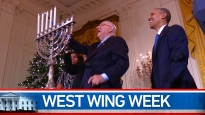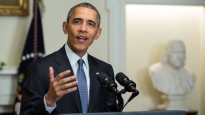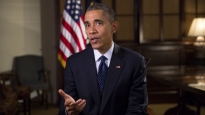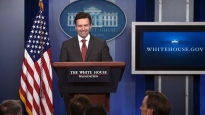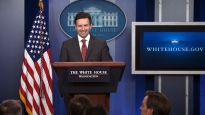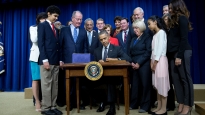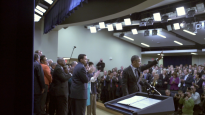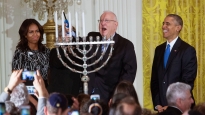Honoring Ronald H. Brown
March 29, 2011 | 35:15 | Public Domain
President Obama speaks about the legacy of Ron Brown as he dedicates the Ronald H. Brown United States Mission to the United Nations Building in New York, NY.
Remarks by the President at Dedication of the Ronald H. Brown United States Mission to the United Nations Building
5:19 P.M. EDT
THE PRESIDENT: Thank you. (Applause.) Everybody, please be seated.
I am so grateful to be here in this beautiful space. Let me begin by thanking the Brown family for making me a part of this celebration. I want to thank President Clinton for his leadership and his outstanding example when it comes to foreign affairs. I want to thank my outstanding -- and I mean outstanding -- U.N. Ambassador, Susan Rice. (Applause.) And the members of the diplomatic community who are here for your wonderful work. Our dedicated U.N. Mission staff. I want to thank Charlie Rangel for helping to make this day possible. Mayor Dinkins, it’s wonderful to see you. All the great friends of Ron Brown.
It is a pleasure to be here. I only met Ron Brown once. I was primarily an admirer from afar. Thank you, Patti, also for your pipes. (Laughter.)
Unlike Ambassador Rice, I didn’t grow up next-door playing basketball on the Brown family court. Although now I know where she got her jump shot and where her brother John got his jump shot. We play occasionally in the “way over 40 league.” (Laughter.)
Unlike many of you, I didn’t directly experience his irrepressible spirit —- always the best-dressed guy in the room. I'm sure he gave some tips to these two. (Laughter.) And the most confident, never losing his cool; an outlook -— as Ted Kennedy put it -— where “no, you can’t” always became “yes, you can.” So Ron Brown was my kind of guy. (Laughter.)
Unlike President Clinton, I didn’t serve with Ron Brown, whose legacy is measured in the lives he touched and the memories that all of you carry. And coming to the podium as the final speaker, I was thinking —- once again, everything has been said, and, once again, Bill Clinton has said it better than I could. (Laughter.)
But while I didn’t know Ron Brown personally, I knew his story, and I drew inspiration from that story. And so when you say he’d be proud that I'm President, I think it’s fair to say that I'm President in part because of him -- because of the example he set; because of the organization that he brought to the Democratic Party; because his capacity to get Bill Clinton elected -- which in turn I think showed how we could govern in a way that met the realities of the late 20th century and ultimately the 21st century. He carved out that path for so many of us. And I know why it’s so fitting that the home of our United Nations -- United States Mission to the United Nations is named in his honor.
Obviously, Ron wasn’t a diplomat in the traditional sense. He never held the rank of ambassador. He never forged a peace accord between warring factions -- unless you include the 1988 Democratic convention. (Laughter.) We’re here not because of the titles that he held, but because of the life he led. Because Ron Brown embodied the values and the ideals, that sense of possibility, that is at the heart of the American story.
His was a quintessentially American story -- growing up in Harlem, serving his country in uniform, working his way through law school, and then just breaking down every barrier that he came across. He lived that American creed that if you work hard enough, if you’re willing to put your shoulders to the wheel, there is nothing you cannot do.
As President Clinton mentioned, he never forgot where he came from. No matter how successful he became, he was there, counseling kids on the street, giving them hope; fighting for workers and minority businesses to make sure that they had the same chances that he had had; mentoring the next generation -- so many of you -- imparting not only wisdom but the inspiration of his example. “The American Dream,” he always believed, “rightfully belongs to every child in this nation.”
Ron Brown brought people together across race and cultures, various stations in life -- an ability that no doubt came from deep within him. He was at once proud of his race -- he never shied away from it -- but he transcended his race at the same time. It was said that some Republican business executives, when they went out on a trade mission, every once in a while they’d look over and say, that was Jesse Jackson’s campaign manager. And yet here I am and I like this guy and he knows my business, and he is helping me succeed.
And in that way, not only was he serving them, but he was also serving the country -- because that understanding that he was fostering on those trade missions, they’d bring that back home and make it easier for people to work together in other contexts. That was the lesson of his life -- that despite all the differences that we supposedly are divided by, at the end, we’re bound by what we have in common, as Americans and as human beings.
And Ron Brown understood America’s unique role in the world. He had that blend of idealism and realism, which recognizes that when we advance the prosperity of others, we advance our interests. The scope of our influence, the values that we care so deeply about, they ripple around the world. And that’s good for us.
That’s why he invested so much time and energy in Africa. It’s why he argued that economic progress and human rights can’t be separated. That’s why he called commerce and economic development the “infrastructure of democracy.” That’s why he was on that flight to the Balkans -- because, he said, just as America “took the lead in the peace process, we need to show the way in rebuilding from the ruins of war.”
We need to show the way. That was what Ron Brown did. And that’s what America and our tireless diplomats do every single day, around the world and here at the United Nations. And so on an occasion such as this, we don’t just dedicate a building; we also rededicate ourselves to the principles that guide us, as a sovereign nation but also as a member of the international community.
We believe, as we declared in the charter of this institution, “in fundamental human rights, in the dignity and worth” of all people and “in the equal rights of men and women and of nations large and small.” And so, as united nations, we address the conditions that make the world more just and conflict less likely -- caring for children, tending to the sick, keeping the peace in places that are wracked by conflict, speaking out for the rights and dignity of every human being.
We believe that just as every sovereign nation has rights, that they also have fundamental responsibilities. Governments exist not simply to perpetuate themselves, their own rule, but to fulfill the aspirations of their people. And history teaches us that nations are more secure and the world is more peaceful when nations meet these responsibilities -- to uphold human rights, to resolve differences peacefully, when we advance our interests together.
We believe that when nations fail to meet these basic obligations -- when peace is threatened or international law is undermined -- that we cannot stand idly by. The words of the charter must have meaning. The writ of the international community must have credibility. Violations of these core principles must have consequences.
Because what we’ve learned from bitter experience -- from the wars that were not prevented, the innocent lives that were not saved —- is that all that’s necessary for evil to triumph is that good people and responsible nations stand by and do nothing. There are times -— as when President Clinton showed extraordinary leadership in the Balkans, and moments such as now in the situation in Libya -- where our conscience and our common interests compel us to act.
We believe that force should not be the first option. We understand the costs and risks involved in the use of force. So, whenever possible, we turn to alternatives that might change behavior —- condemnation that puts violators on notice, sanctions that increase pressure, embargoes that block arms to aggressors, and accountability for those who commit crimes. And should those prove insufficient, we have to be prepared to take the necessary measures to uphold international peace and security and protect innocent people. That's what we’re doing in Libya, in large part because of the extraordinary work of some people in this room.
And finally, we believe that the world is more secure and the interests of the United States are best advanced, when we act collectively. As I said last night, the burden of action should not always be America’s alone. So in Libya today we see a broad and growing coalition, including Arab partners. And I had to apologize to President Clinton before he walked out because he never sees his wife. (Laughter.) But the extraordinary work she’s doing in London today, the extraordinary work that she’s done over the past several months is part of that core understanding that when we act together, it’s a force multiplier.
Today we see the NATO Alliance in command of the arms embargo, the no-fly zone; starting tomorrow, the mission to protect the Libyan people. We see the United Nations and many international organizations providing the assistance that’s needed to people who’ve been harmed by Qaddafi over the last several weeks. Today in London we’re seeing more than 30 nations and the Libyan opposition come together to support a transition to a future that better serves the Libyan people.
That’s how the international community should work -- more nations; the United States right there at the center of it, but not alone -- everybody stepping up, bearing their responsibilities, carrying the costs of upholding peace and security. That’s what it means to be united nations. That was the vision imagined by the founders of this institution.
“In our disillusionment after the last war,” Franklin Roosevelt said, “we gave up the hope of gradually achieving a better peace because we had not the courage to fulfill our responsibilities in an admittedly imperfect world.” And over the past six decades, there have been times where this imperfect institution and its members did not find the courage to fulfill our responsibilities. And we are forever haunted by that. We have seen the consequences of that in atrocities that might have been prevented.
And yet today in Libya, we are showing what’s possible when we find our courage; when we fulfill our responsibilities and when we come together, as an international community, to defend our common interests and our common values. We’re saving innocent lives. We’re making it clear that the United States of America, and the world, stand with those who seek to determine their own destiny, free from fear, and free to dream of a day when they, too, can live in justice and dignity.
I think that’s the essence of American leadership. That’s what it means to lead. This is the purpose of the United Nations. And this will be the work of all who now labor in a building that bears the name of somebody who understood leadership, who lived a life of leadership, and that is Ronald H. Brown. We are grateful to him. And I cannot think of a better way to honor the extraordinary work that he has done and the influence that he continues to carry in all of our lives.
So with that, I would like to invite Alma, Michael and Tracey to join me for the presentation. (Applause.)
END
5:35 P.M. EDT
|
December 14, 2015
|
December 12, 2015
|
December 12, 2015
|
December 11, 2015
|
|
December 10, 2015
|
December 10, 2015
|
December 10, 2015
|
December 9, 2015
|
- &lsaquo previous
- …
- 82
- 83
- 84
- 85
- 86
- 87
- 88
- 89
- 90
- …
- next &rsaquo
